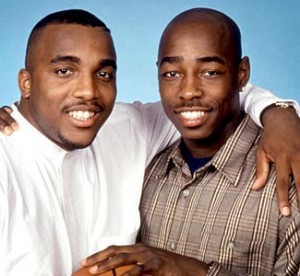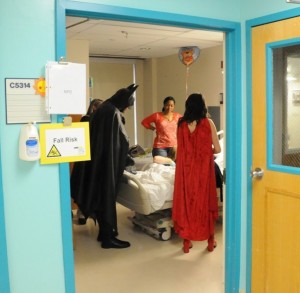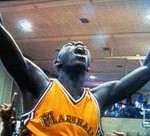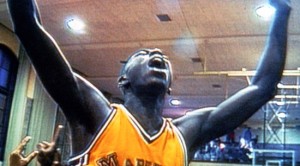
In the film “Hoop Dreams,” we have to wonder why the two main characters are compared to each other the way they are. William and Arthur start off in similar situations where their lives spiral onto two completely different paths because of outside influences. As kids, they believed everything that was promised to them and were vulnerable to what I would call “being sold a dream.” William and Arthur both were talented basketball players as children, but William was more physically developed than Arthur was. William was ready to play on the Varsity level, and as a result he was able to obtain a scholarship to that private school. William was able to reap benefits from people who were not actually affiliated with the school. Such outside factors act as an outlet for the school system to follow their policy while simultaneously allowing special treatment to certain students.
The school was able to stand behind their regulations and seem fair behind kicking Arthur out of school. The viewer at this point empathizes with Arthur for getting kicked out of the school that seemed so promising to him. Only, as the movie goes on, we start to understand that because of what was invested in William, his biggest expectation was to play basketball well. As William and Arthur advance through High School we see their progression in class as well as on the basketball court. The audience views William not only in a much better facility than Arthur but also showered with extra attention in order for him to do well. William receives one on one tutoring while Arthur has to learn Senior English in a summer school class where the teacher had to teach all high school levels at the same time. We see William able to spend many hours practicing in the gym as Arthur works many hours at his job only making minimum wage.
Though Arthur was forced to return to his under privileged school, he finds ways to express himself. The camera catches him with his friends listening to music, dancing, and joking around. William seemed to be surrounded by people that he couldn’t relate to. Perhaps James displayed Arthur’s moments of expression and not William to imply William was stripped from these opportunities because of his school.
William gets hurt his junior year and had to sit out the rest of the season. William works hard to recover and during his senior year he returned as the team’s leading scorer during the season. However, William speaks out and says that the same teammates that idolized him before he was hurt lost respect for him when he returned because he wasn’t as explosive as he used to be. We see Arthur progression on the court through high school. Arthur was not the leading scorer on the team through school and his coach had many thoughts on how he could improve, but Arthur’s chemistry with his teammates was much stronger than William and his teammates.
Through all the extra perks and attention William received compared to Arthur, the audience watches William express to his coach that he wasn’t generally pleased with his time at the private school. I believe James captured a great moment with the audience when the coach says to the camera, “it’s how it goes… One kid goes out, another one comes in.” William couldn’t relate to his coach. His coach was there to win and win only, which explains why they recruited. Arthur’s coach believed in him. Arthur may not have gotten the best education, but he wasn’t a victim to any system. He was able to mature into the man that he wanted to become.
The viewer is able to see both lives develop. The beginning and the end of the movie tell the whole story. Arthur had a harder life, but in the end he pursued his basketball dream longer than William did. Perhaps James wanted his viewers to understand that maybe ones destiny is a result of a person’s ambition and not in the advanced commodities around you. Because of all the extra attention from his coaches, teachers, and his sponsor William was expected to become a “promising athlete.” Once he hurt himself he lost the attention from his teammates and his coach. William expresses that his coach would not empathize with him whenever he went to his coach with personal problems not relating to basketball. James shows how William is pushed to go to college. William is able to take his ACT 5 times before he becomes eligible to get into a four year institution. At the same time, James shows how easy it would have been for Arthur not to finish school. His best friend dropped out of high school and his mother was more focused on Arthur finishing high school than going to college. Arthur finishing high school and enrolling into a Junior college showed Arthur’s will and determination.
James’ “Hoop Dreams,” exposes the reality of special treatment. Arthur was still in college by the time William dropped out. The audience sees Arthur enjoying high school more than William even though William was in a much better school. Had William stopped playing basketball he probably would have lost his scholarship and got kicked out of school just as Arthur did. William did not have as many options as he did perks in high school. Arthur made the choice to finish school and go to college. William was pushed to go to college. William was a part of a system designed to make sure their students get to college. Arthur was part of a community where many never made it to college. I think this was what James wanted his viewers to see. Arthur was able to make his own choices when following his dream. William was promised his dream as long as he followed the designed program. My guess is that after it was all said and done, William would be the one to say, “If I could relive high school, I would of made the choice to do things differently.”








